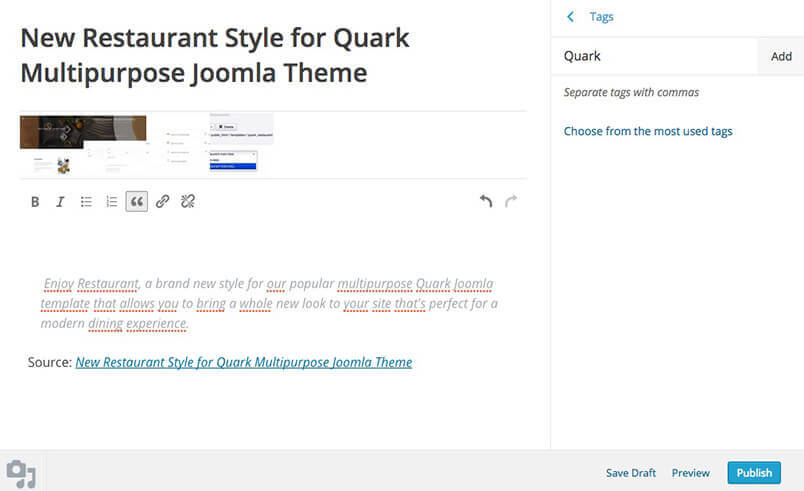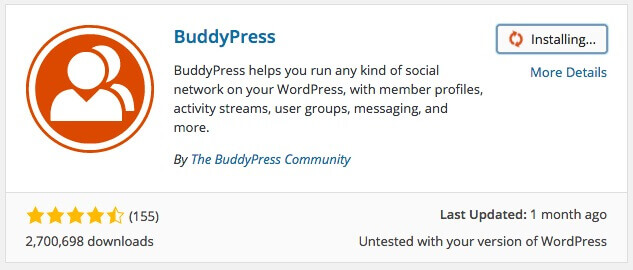The second beta version of WordPress 4.2 was released a few days ago, and if everything goes smoothly we should see the final (stable) version released around April 22, so now’s a good time to have a look at what new features we’ll be seeing in this new version.

First off, if you’re interested in testing WordPress 4.2 in advance you can download the WordPress 4.2 beta 2. Alternatively, you can use use the WordPress Beta Tester plugin. If you choose the second option you will need to make sure that you’ve selected the "bleeding edge nightlies" option in your plugin settings, otherwise you’ll only be getting the stable versions of any updates. Please remember that this software is still in development, so it's not recommended to run it on a production site. Consider setting up a test site just to play with the new version and give the new features a whirl.
Press This feature
One of the bigger changes in version 4.2 is the modified Press This feature. The "Press This" function theoretically was to be used to instantly create posts based on external content; if you come across an interesting quotation, for example, and wanted to discuss it on your blog you could select the quote text, click a bookmark and get a pop-up window where you could modify the quoted text and build a post ready to publish. That was the idea anyway, but generally real usage fell short of these goals; the functionality didn’t work so well and as such was rarely used by most bloggers. However, the developers have been working hard to make this feature more viable and easy to use, and the results may well be worth it.
To use the Press This feature, you should first find the option in the Tools tab of your Dashboard. You’ll need to drag the “Press This” button to your bookmarks bar for this to work. Then, when you’re on a page you want to share, press it!
The script will take the page title, content fragment, a link to the source and creates thumbnails of any available pictures above the editor; clicking on a thumbnail will add it to your post content. Please note that these images are not added to the media library automatically. We can also choose the format of our post, assign it a category and define any tags too. If it lives up to the promise and works effectively, this tool will be extremely useful for any bloggers or content creators who rely heavily on critiquing or discussing external content or websites.

Emoji in WordPress 4.2?
Starting in WordPress 4.2, native Emoji support will be available in most WordPress installs. What’s Emoji? You’ve almost certainly seen emoticons, unless you’ve managed to successfully avoid Messenger, Skype, Facebook, or pretty much every social or chat program or website that’s existed over the last 20 years. They’re the little icons used to represent a variety of facial expressions (and ninjas, for some reason). Generally if you want to let people know that what you’ve written was meant in jest you’d add a little smile to the text, like so: ":-)", and most modern apps will automatically replaces any hand-crafted symbol faces with actual icons that are far easier to follow for the uninitiated.
What emoji offers is the next step up; instead of writing 3 characters, you can instead “type” the icon via a special keyboard on your phone/mobile or via the Special Characters item in the Edit menu on OS X. Native emoji support means there’s a huge range of new characters available that will still have less weight in your text than the traditional emoticons, since Emoji count as just one character. A nice addition, though it’s not going to set the WordPress world on fire!
If you’re interested in taking advantage of emojis in your WordPress installation bear in mind that Emoji uses utf8mb4 encoding, which is only supported in MySQL 5.5 or higher. If you want to use this feature and you’re still running a lower version, you’ll need to upgrade beforehand.
Plugin updates and installation
In WordPress 4.2 you'll be able to install or update your plugins directly from the plugin lists. Now, there's no need to move to the installation/update screen and then go back to the plugin list to update another plugin, which, while it still works, is pretty darned tedious. This simple change is very useful and convenient, and a welcome addition.

Browsing themes in the customizer
Browsing and switching available installed themes in WordPress 4.2 will be added to the Customizer to make switching faster and more convenient. This feature brings theme-browsing and theme-switching functionality into the Customizer, so you won’t need to rely on the separate theme section of the dashboard anymore, unless you want to of course! By integrating themes directly into the Customizer, live-previewing workflows are greatly simplified, and the relationship between themes and theme/site options is clarified for the user, so it’s really helpful and will continue to build on the live preview that has already proven invaluable for our users when setting theme options.
A list of all upcoming features/improvements may be found in this WordPress.org news piece on the first beta and this article on the second beta’s status.